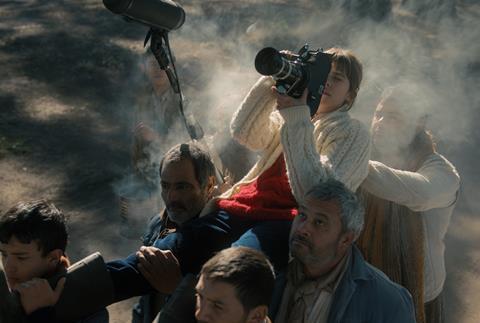Santiago Fillol’s directorial debut works an old Argentinian prose text into a potent modern film

Dir: Santiago Fillol. Argentina/France/Spain. 2022. 106mins
A potent and thoughtful debut about the political power of film and a whole lot else besides, this directorial debut by Santiago Fillol, the co-scriptwriter of critically lauded Oliver Laxe films Mimosas (2016) and Fire Will Come (2019), is the story of a 1970s director who goes in pursuit of the authentic and ends up being dragged into the real. Though infused with a calculating, cerebral air which sometimes prevents it from driving home its dramatic punches, enough gothic intrigue remains for Matadero to work well as a slow-burning political thriller with shades of Costa-Gavras.
These weighty themes are carefully woven into a compelling plot
The symbolic title means “slaughter yard”, a title taken from Esteban Echeverria’s 1830s political short story of the same name – a piece about state repression widely thought to be the first Argentinian work of prose fiction and which is the inspiration behind Matadero. Intellectual but accessible, the film seems well positioned for a festival life beyond its screenings at Locarno and now Seville.
In 1974 Argentina, Peronism is on its last legs and, as we know in hindsight, a period of dictatorships is about to begin. American B-movie director Jared Reed (Julio Perillan) is trying to bring Echeverria’s story to the big screen for the first time; a floppy-haired tyrant, he’s obsessed with telling big truths without necessarily understanding the details. His adaptation is struggling financially and, after his producer abandons him, Jared and his wife Sheila (Lina Gorbaneva) – who has tellingly given up acting after being with Jared – relocate to a ranch owned by the family of his adoring sidekick Vicenta (Malena Villa), a former UCLA student who wants to make a different kind of Argentinian film.
Tensions at the ranch amongst cast and crew are felt immediately; Jared is, it becomes clear, only too prepared to forgo human considerations if it means making the movie he wants. Indeed, one of Matadero’s sequences makes for horrific, “authentic” viewing of the kind Jared cherishes, and its dark bloodiness will hang heavy over viewers and characters for the rest of the duration. The script of Jared’s film-within-a-film is fluid, with the director trying to take it down one political road and actors like Barbara (Ailin Salas) and Lisandro (Rafael Federman) – the slavish Vicenta apart – increasingly wishing to take a different path.
Matadero questions what responsibilities political films can and should carry; how well placed (or not) outsiders are to make films about countries not their own (Vicenta is quick to point out how Jared has mixed up local politics); and whether authenticity should sometimes be traded for truth. (Jared ultimately achieves an authenticity that is tragically far beyond anything he was seeking.) But these weighty themes are carefully woven into a compelling plot that unfolds in a huge, quasi-gothic mansion somewhere in the middle of the pampa; misty but becoming increasingly windswept as the tension rises, and all beautifully shot by Mauro Herce.
Performances are solid, with Salas standing out for her mix of vulnerability and defiance, though Gorbaneva feels surplus to dramatic requirements. Perillan sometimes relishes his role as the impassioned film director a little too much, a couple of times tipping over into the risible. And despite striking the odd poetic note, Vicenta’s voiceover, as she looks back over events years later, doesn’t tell us much that we don’t already know, adding another level of unnecessarily complexity to a film which is already intricate enough.
Production companies: El Viaje Films, 4 A 4 Productions, Nina Produccions, Magoya Films
International sales: Alief info@alief.co.uk
Producers: Fernando Molnar, Nicolas Avruj
Screenplay: Edgardo Dobry, Santiago Fillol, Lucas Vermal
Cinematography: Mauro Herce
Production design: Ana Cambre
Editing: Cristobal Fernandez
Music: Cristobal Fernandez, Gerard Gil
Main cast: Julio Perillan, Malena Villa, Ailin Salas, Rafael Federman, Lina Gorbaneva, Ernestina Gatti






![The Brightest SunScreen[Courtesy HKIFF]](https://d1nslcd7m2225b.cloudfront.net/Pictures/274x183/3/5/0/1448350_thebrightestsunscreencourtesyhkiff_312678.jpg)















![The Brightest SunScreen[Courtesy HKIFF]](https://d1nslcd7m2225b.cloudfront.net/Pictures/100x67/3/5/0/1448350_thebrightestsunscreencourtesyhkiff_312678.jpg)

